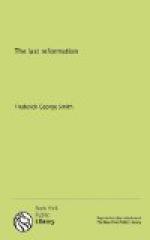The same principles that developed local ministers produced also ministers of the general class. While some naturally became “pastors,” “teachers,” and “helpers” in the local church, particular gifts and qualifications fitted others for “apostles” and “evangelists,” whose particular sphere was general oversight and work in the churches. The prophet was not limited to either class.
[Sidenote: Apostolic oversight]
As it is not germane to my present purpose, I shall not here attempt to define the various phases of ministerial work designated by various terms but all included under the one generic term “elder.” The work described by the term “apostle,” however, requires brief notice, on account of its bearing on the subject of church government. The fact that Paul had particular “care of all the churches” (2 Cor. 11:28) and that he gave special instructions to Timothy and Titus, other ministers (1 Tim. 5: 21; Tit. 1:5), forms the basis for the episcopacy argument—church rule by a superior order of clergy called bishops.
“Apostle” literally signifies “a planter.” The term belongs specifically to the first founders of the Christian faith, but is loosely applied in a more general sense to any minister who plants Christianity in a new territory. It is clear that the first apostles were especially inspired for a particular work in laying the foundations of the Christian church and in writing the New Testament Scriptures. Hence the apostolic office in this special sense passed away with them. But there was, nevertheless, an apostolic work such as planting and overseeing the infant work in a new field, and in this sense Barnabas also was an apostle (Acts 13:46 with 14:4).
That the word “apostle” really signified a planter and was therefore descriptive of the kind of work done is shown by the words of Paul himself: “For he that wrought effectually in Peter to the apostleship of the circumcision, the same was mighty in me toward the Gentiles” (Gal. 2:8). And again, he says to the Corinthians, “If I be not an apostle unto others, yet doubtless I am to you; for the seal of mine apostleship are ye in the Lord” (1 Cor. 9:2). In another place he says to the same church, “Though ye have ten thousand instructors in Christ, yet have ye not many fathers: for in Christ Jesus I have begotten you through the gospel” (1 Cor. 4:15).
The special, personal relation that the apostle, or planter, sustained to the work which he had founded and over which he exercised general jurisdiction, was but temporary, a sort of fatherly care. He was obliged to oversee the work as a whole, including young ministers, until it became thoroughly established. After others were able for the work and the apostle’s special oversight was withdrawn, there might be ten thousand other instructors, but no more fathers. This disproves entirely the episcopal idea as an essential feature of church government. The apostle Peter




